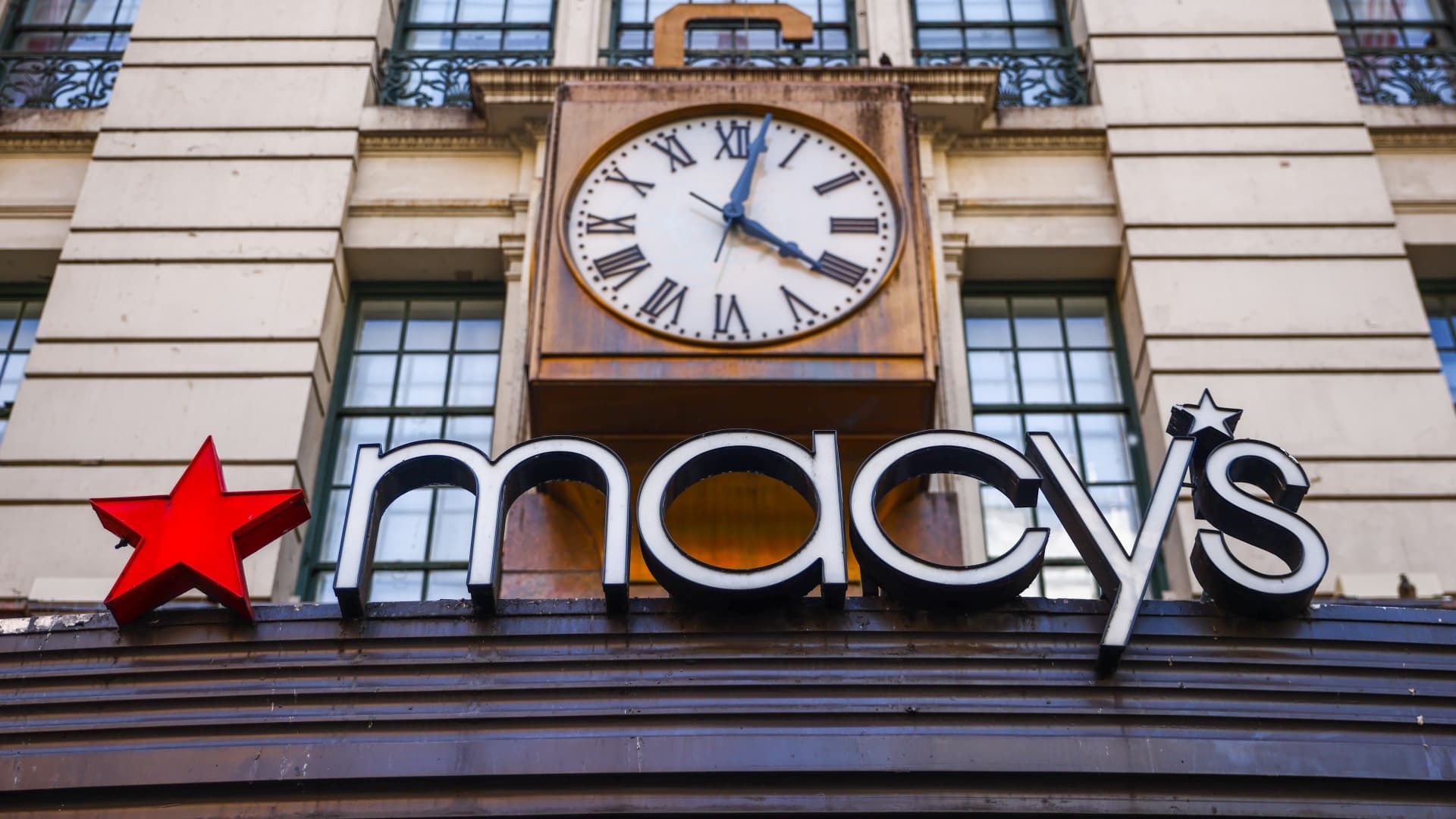Macy's The department store operator on Wednesday lowered its full-year sales forecast as it said it is competing with selective buyers and more promotions.
The retailer posted a mixed quarter as it beat Wall Street's profit expectations but missed revenue.
Macy's said it now expects net sales of between $22.1 billion and $22.4 billion, which is lower than the range of $22.3 billion to $22.9 billion it had previously anticipated. That would also be a year-over-year decline from the $23.09 billion it reported for fiscal 2023.
Macy's expects comparable sales, which strip out the impact of store openings and closings, to range from a decline of about 2% to a decline of about 0.5%. It had previously expected comparable sales to range from a decline of about 1% to a gain of 1.5%. That metric includes owned and licensed sales, which encompass merchandise Macy's owns and items from brands that pay for space inside its stores, along with Macy's third-party online marketplace.
The department store operator said in a press release that the new outlook range “provides flexibility to address the current uncertainty in the consumer discretionary market.”
In an interview with CNBC, Chief Executive Tony Spring said customers aren't spending as freely across all of Macy's brands, including upmarket department store Bloomingdale's.
“We're seeing a certain weakness, a certain caution, a delay in conversion to purchase,” he said. “And people are responding to things they want, things that are priced high, things that are new, but even the affluent consumer is not spending like they did a year ago.”
He said there's “a lot of noise out there” that's distracting customers or causing them to put off spending, including higher interest rates, inconsistent weather patterns and a very active news cycle.
Here's what Macy's reported for the fiscal second quarter compared with what Wall Street expected, according to a survey of analysts by LSEG:
- Earnings per share: 53 cents adjusted versus 30 cents expected
- Revenue: $4.94 billion versus the expected $5.12 billion
The company's shares fell more than 9% in premarket trading.
The iconic department store is scrambling to get back on a stronger footing and sustain growth. Spring announced in February that the retailer would close about 150 (or nearly a third) of its namesake stores and invest in the roughly 350 locations that remain. It plans to close the locations by early 2027.
It is also opening new, smaller Macy's stores in suburban malls and adding branches of its top-performing brands, Bloomingdale's and Bluemercury.
But Macy's results last quarter revealed its struggles to achieve that recovery at a time when consumers have been more selective about purchases, especially of items that are wants rather than needs.
Net sales fell from $5.13 billion in the same period a year earlier.
The namesake Macy's brand remained the company's worst performer. Comparable sales fell 3.6% based on owned sales plus licensed sales, including third-party marketing.
At Bloomingdale's, comparable sales decreased 1.4% based on owned plus licensed products, including third-party marketing. And Bluemercury comparable sales increased 2%, marking the beauty brand's 14th consecutive quarter of comparable sales growth.
In the three-month period ended Aug. 3, Macy's net income was $150 million, or 53 cents a share, compared with a loss of $22 million, or 8 cents a share, in the same period a year earlier.
However, even excluding the weaker stores that Macy's is closing, sales were lackluster. Comparable sales for its future namesake brand (which includes Macy's stores that will remain open and online sales) declined 3.3% on a company-owned stores plus licensed basis, including the third-party marketplace.
Macy's noted that it has made progress on its turnaround plan, which it unveiled in February, shortly after Spring took over as the company's top job. At the first 50 stores that received additional investment, comparable sales rose 1% on a company-owned plus licensed basis. It was the second consecutive quarter of positive comparable sales at those stores since the plan began.
Spring said those 50 stores have outperformed Macy's other locations, even in hard-hit categories like handbags. She said the company will share its plans to expand the strategy beyond those stores in the fourth quarter, but has already decided it will increase staffing in the women's shoe and handbag departments at more of its locations because of customer response.
In addition to a shaky retail environment, Macy's leaders also faced a proposal from an activist group to take the company private. Macy's said last month that its board had unanimously decided to end negotiations with Arkhouse Management and Brigade Capital.
Macy's shares closed Tuesday at $17.74, bringing the company's market capitalization to $4.9 billion. As of Tuesday's close, the company's stock was down 12% so far this year, lagging the S&P 500's gain of about 17% over the same period.









